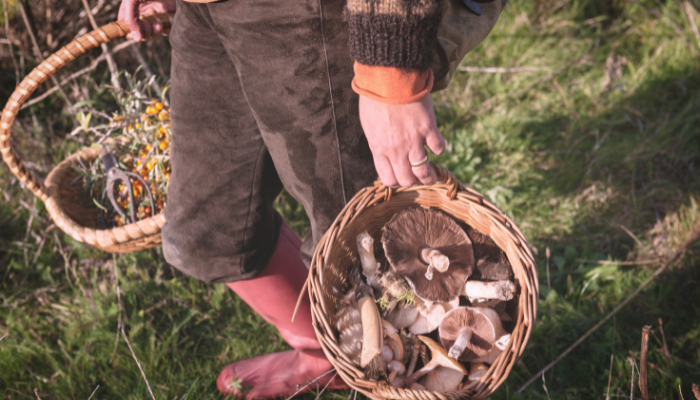30 May 2025
Exploring Farm Diversification: Foraging

Barry Caslin, Energy & Rural Development Specialist, discusses how farmers can diversify by providing their lands for foraging activities. Foraging involves the gathering of wild edible plants, herbs, mushrooms, or other natural resources from the land.
Why foraging can be a diversification option
Allowing individuals or groups to forage on their land can be a sustainable diversification option for farmers, offering several benefits:
Utilisation of Natural Resources
Farm lands often harbor diverse ecosystems with wild edible plants, herbs, mushrooms, or berries. Allowing responsible foraging can utilise these natural resources.
Diversification of Income
Farmers can charge foraging fees or offer guided foraging tours, creating an additional revenue stream without significant impact on agricultural operations.
Eco-Tourism and Nature-based Activities
Foraging activities attract nature enthusiasts, eco-tourists, and individuals interested in exploring and learning about wild foods and natural habitats.
Promotion of Biodiversity
Encouraging responsible foraging practices promotes biodiversity conservation and appreciation for natural ecosystems on the farm.
Considerations
However, farmers considering land use for foraging should consider the following:
Regulations and Permits
Check local regulations and obtain necessary permits or permissions for foraging activities on the farm.
Guidelines and Rules
Establish guidelines for foragers to ensure responsible and sustainable practices. Educate participants about respecting the land, not disturbing wildlife, and only harvesting what’s safe and permitted.
Safety and Liability
Ensure participant safety by identifying potential hazards on the land and addressing them. Consider liability insurance coverage for participants engaging in foraging activities.
Education and Information
Provide information about the types of plants or resources available for foraging and possibly offer guided tours or educational sessions led by knowledgeable individuals.
Environmental Impact
Monitor and manage the impact of foraging on the ecosystem to prevent over-harvesting or damage to sensitive habitats.
By allowing responsible foraging on their lands, farmers can create a mutually beneficial arrangement that not only generates additional income but also promotes sustainable land use, ecotourism, and appreciation for natural resources and biodiversity.
Further information about foraging is available from Wicklow Wild Foods
Read the full publication: Branching Out – A Guide to Farm Diversification in Ireland
Explore Teagasc’s Rural Development information series and available support for farmers
